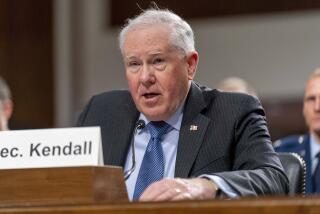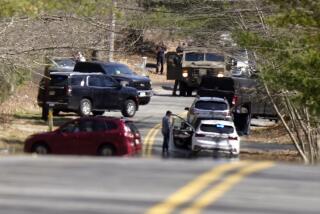Lockheed Assurances on Project Rejected
- Share via
WASHINGTON — Federal officials rejected assurances Thursday by Lockheed Corp. that a top-secret Air Force project has not been compromised despite the loss of hundreds of classified documents.
The officials expressed skepticism after Lockheed Board Chairman Lawrence O. Kitchen acknowledged the document loss before a congressional subcommittee but insisted that there has been “no actual compromise” of program security. Although no one would publicly identify the project being discussed, congressional sources said it involved a secret Stealth fighter aircraft being produced by the Lockheed division in Burbank.
Rep. John D. Dingell (D-Mich.), chairman of the subcommittee conducting hearings on Lockheed’s loss of classified files, said guarantees of plant security by Lockheed and other defense contractors are not enough.
“Clearly, more aggressive government oversight is needed,” Dingell said. “How can we take comfort in Lockheed’s assurances . . . that the missing documents have not been compromised?”
Assistant Secretary of Defense Robert B. Sims was asked by reporters about Kitchen’s admissions that 1,400 blueprints, photographs, films and other materials on the project cannot be accounted for.
Sims said the Pentagon has no indication that secret Lockheed data “has been compromised in the sense of getting to some foreign government or being lost to someone on the outside.” But he added that “obviously an inability to account for the documents internally makes it difficult--and in fact impossible--to know if such compromises have occurred.”
Although Lockheed’s document fiasco was first disclosed by Dingell a month ago, Kitchen’s congressional testimony Thursday marked the first admission of major management errors by Lockheed officials, who previously had minimized Dingell’s allegations. Kitchen said he had found a laxity that he considers inexcusable in the handling of the classified materials. He told the congressmen that “we are committed to full and timely corrective action” including a study of the problem by a panel of outside experts.
Kitchen, who also is the company’s chief executive officer, testified that “this is an oversight for which Lockheed management--up to and including me--accepts your criticism.”
No one in senior management ever tried to mislead the subcommittee but “we regret the initial misstatements by a newly hired junior-level manager in our security department,” Kitchen said.
Shown to Girlfriend
Dingell told the hearing that his staff had found that a plant assembler once removed classified blueprints to show his girlfriend what an important project he was working on. He returned them the next day concealed in a newspaper, but the girlfriend contacted Lockheed security officials, Dingell related.
Kitchen said this employee, whom he did not identify, was fired after he admitted taking the blueprints.
“It is outrageous they got out,” Kitchen said. “None of this makes me feel good . . . there is no way you can provide absolute security.” Dingell said other defense contractors have shown a similar “absence of controls” over materials used in top-secret projects. He said the Pentagon needs to exert closer supervision.
More to Read
Inside the business of entertainment
The Wide Shot brings you news, analysis and insights on everything from streaming wars to production — and what it all means for the future.
You may occasionally receive promotional content from the Los Angeles Times.










